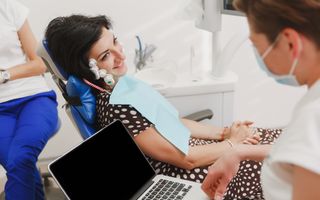Neuromuscular Dentistry
Examining the system that controls the positioning and function of your jaw and neck.

Your dentist is an expert on healthy teeth and gums, but there’s more to your oral health than just these aspects.
One vital part of your oral health is your temporomandibular joints (TMJ), which are the joints on each side of your face that allow you to open and close your mouth. When everything is in order, you can open your mouth to chew, speak, and smile with ease, but if something is misplaced, it can make these actions difficult or painful.
Neuromuscular dentistry is the type of dentistry that seeks to avoid, minimise, and fix these issues. It includes various TMJ treatment options that largely depend on the issue causing the problems.
What is Neuromuscular Dentistry?
Neuromuscular dentistry (NMD) is a specialist field that examines the entire system that controls the positioning and function of your jaw and neck. It uses modern technology to align the jaw and neck to eliminate pain and other TMJ (Temporomandibular Joint) symptoms.
Some of the common TMJ disorder symptoms may include:
- Headaches
- Shoulder, neck and back pain
- Clenching or grinding of your teeth and jaw
- Clicking or popping sounds in the jaw joints
- Jaw pain
- Loose teeth
- Worn or cracked teeth and fillings
- Numbness/tingling of the arms and fingers
The science of neuromuscular dentistry is based on the understanding that your jaw needs to be aligned and in its most relaxed position at rest. The problem could stem from:
- Misaligned teeth
- Bruxism (tooth clenching)
- Misaligned jaw
- Incorrect jaw positioning
Your dentist will weigh up the complex relationship between your teeth, jaw joints and muscles and make a decision about how to best realign your jaw. Once your jaw is properly aligned and your teeth are in place, you can enjoy a more functional, pain-free smile.
How does a Neuromuscular Dentistry treatment work?
Your exact TMJ or neuromuscular dentistry treatment will depend on what exactly is causing you problems.
For example, if your jaw is misaligned, your dentist may seek to relax the muscles around the jaw by using a Transcutaneous Electrical Neural Stimulation (TENS) device. This is an ultra-low frequency unit that deprograms and relaxes muscles, allowing the dentist to correct and realign your bite.
A K7 machine is then used to find your optimal jaw position. This very sensitive measuring tool uses electromyography, sonography, and jaw-tracking scans to record your muscle tension and listen to your jaw joint, while at rest and while functioning.

You may also be provided with personalised orthotic devices to gently align your jaw. In this treatment, you will wear a removable (or fixed, in some cases) dental device that will keep the position of your jaw in a more relaxed position. This device is individually made for you, according to your condition and the position of your jaw.
Advantages of receiving Neuromuscular Dentistry
Not everyone needs neuromuscular dentistry, but when you do, it can be hugely beneficial to your oral health and overall happiness.
- Pain-free eating and speaking: When there’s an issue with your temporomandibular joint, it often leads to pain. Neuromuscular dentistry can help to fix the issue and remove the pain.
- Better dental health: If your jaw is mis-aligned, it can mean you wear down certain teeth in an uneven manner, which can cause more issues down the line. Fixing your jaw problems can, therefore, protect your dental health.
- Better general health: Your jaw can have more of an impact on your overall health than you may realise. By receiving neuromuscular dentistry treatments, you may be able to improve pain and discomfort in other areas such as your back, shoulders, and arms.
What to expect from your Neuromuscular Dentistry appointment
Each neuromuscular dentistry appointment is different, depending on what’s giving you problems and how your dental professional decides to treat it.
Generally speaking, here’s what you can expect from a neuromuscular dentistry check-up.
- Brush and floss your teeth before you arrive
- Be prepared to discuss your symptoms, including pains throughout your body that you might not even think are connected
- Your neuromuscular dentist will do a physical examination
- They will also take x-rays of your mouth
- They will ask you a series of questions about your oral health, including pain or discomfort, and clicking of your jaw, headaches, and other related issues
- Your dentist may need to do further tests to determine the cause of the issue
- In most cases, they should be able to determine the problem and begin a treatment plan, where they will outline the steps and what it all involves
- Be sure to ask any questions you have
If you are experiencing neck or jaw pain and you haven’t found the cause of your issues, we recommend reaching out to neuromuscular dental specialist to assist you in understanding and potentially resolving your neck and jaw problems.
For more information on how neuromuscular dentistry can help you and your smile, get in touch with our friendly team today.
Frequently asked questions
Fixing a misaligned jaw depends on the cause of the misalignment. In some cases, it can be as simple as receiving orthodontic treatment (braces) to straighten your teeth for a healthier bite. In other cases, the problem may be mechanical and require jaw surgery.
A neuromuscular dentist will be able to examine your mouth and jaw to determine the cause of your jaw misalignment and offer a treatment plan specifically for your needs.
If your jaw is causing you pain, making eating or speaking difficult, damaging your dental health, or creating a facial deformity that saps your self-confidence, then jaw surgery can vastly improve or even completely fix these issues.
Your neuromuscular dentist will be able to talk you through the specific benefits for you, whether that means a wider, brighter smile, or better oral health for life.
There are both short-term and long-term options for relieving the pain of a TMJ disorder. In the short term, you can take anti-inflammatory drugs, avoid hard foods, and hold an ice pack against your jaw. You can also wear a night guard and perform jaw exercises to release some of the tension in your jaw.
In the long-term, a neuromuscular dentist can offer treatment for the cause of your TMJ problems.
Yes, many kinds of TMJ problems can go away on their own. You can help to speed up your recovery by resting your jaw, taking anti-inflammatories, and eating soft foods.
If your TMJ does not start improving after a couple of weeks or is causing you real discomfort, visit your dentist for an exam and professional advice.
Minor TMJ issues can clear up on their own over time and with a little TLC, but some TMJ problems can get worse and cause more issues over time. For example, you may experience more discomfort and pain if you don’t have the underlying cause of your TMJ issues treated.
It’s also possible that a TMJ disorder will negatively affect your dental health. You may start chewing and biting unevenly, which can wear down teeth in one specific area or cause added stress to your teeth that leads to dental cracks and other issues.
If you’re concerned about your TMJ disorder, speak to your dentist. They will be able to assess the situation and determine what kind of treatment you need (if any), and what might happen if it is left untreated.

